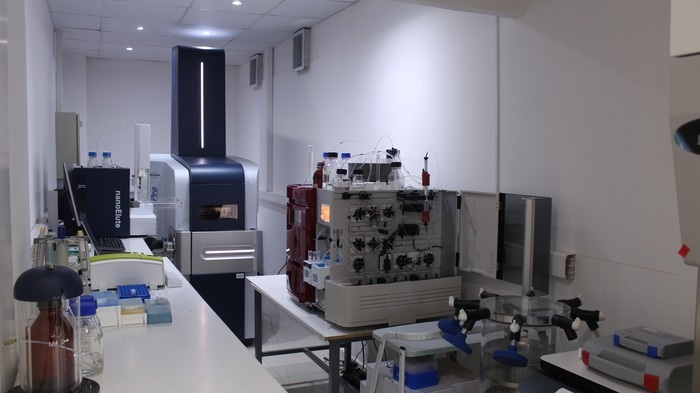After analyzing data from a public repository, CD4-T, CD8-T cells, and Treg cells, a team of researchers led by bioinformatics Mabel Vidal from the University of Concepcion and working with researchers from MELISA Institute and other academic institutions discovered a distinctive genetic signature among subsets of infiltrating T cells of various types of cancer. International Journal of Molecular Sciences published the study.
 timsTOF Pro mass spectrometer located in MELISA Institute's laboratories. Image Credit: MELISA Institute
timsTOF Pro mass spectrometer located in MELISA Institute's laboratories. Image Credit: MELISA Institute
The immune system is made up of many cells that work together to defend the body against infection or the development of cancerous cells. The primary players in the recognition of harmful antigens or neoplastic transformation are T cells.
These can be separated into three primary subpopulations: Tregs, which control or moderate immune response, auxiliary CD4+ T cells, which help differentiate various effector lineages, and cytotoxic CD8+ T cells, which kill pathogenic agents.
Although it is known that these T-cell subsets can infiltrate many cancers, it is unknown whether or not they share the same transcriptomes, or mRNA gene expression profiles, as resident T cells seen in healthy tissues.
This study examined the single-cell transcriptome of five invading CD4-T, CD8-T, and Treg tumors derived from various cancer types in an effort to pinpoint distinct pathways for each subset in neoplastic settings.
First, public databases (Gene Expression Omnibus) were searched for transcriptome data for the most prevalent malignancies, including colon, breast, lung, head and neck, and melanoma.
The distinct cell types were then identified, and only those mRNA data pertaining to T cells were filtered. Then, scientists discovered the biological functions and pathways that are shared by various cancer types but are absent from healthy conditions.
Artificial intelligence (AI) was a crucial tool for Dr Mabel Vidal to evaluate the vast amount of data and find and resolve issues.
To classify the different types of cells using an unsupervised method was a great challenge, because even if you know the identity of each of the T cells beforehand, as a scientist you have to generate a classification algorithm that is capable of automating this task for large volumes of data.”
Dr Mabel Vidal, Department of Computer Science, University of Concepcion
Additionally, she noted that when using publicly available data, the information was derived from various studies, tools, and research goals, making data standardization an equally pertinent and significant challenge.
The second phase of the study was empirically testing the classification system using transcriptomics data previously obtained from Dr Estefania Nova-Lamperti’s lab at the University of Concepcion and performing proteomics at the MELISA Institute.
We already had samples from patients with different types of cancer, and we were partially aware of common signaling pathways among them. In this research we found that the signaling of cytokines mediating the TH2 response is increased.”
Estefania Nova-Lamperti, Molecular and Translational Immunology Laboratory, Department of Biochemistry and Clinical Immunology, School of Pharmacy, University of Concepcion.
MELISA Institute’s Chief Laboratory Officer, Mauricio Hernandez, indicated that “To validate the results obtained from bioinformatics analyzes of transcriptomes of the different T-cell populations, we identified the protein profile, or proteome, of CD4 T cells using our mass spectrometer. In general, we obtained very good correlations from the point of view of the identified pathways.”
Dr Vidal noted that since this study was carried out in a Machine Learning setting, modeling it in a Deep Learning context and creating new models with higher accuracy for single-cell analysis will be the next step.
She added, “The idea is to integrate more data and identify common patterns, perhaps more specifically. So, the idea is to continue along the line of artificial intelligence.”
Last but not least, Prof. Elard Koch, senior researcher and chairman at the MELISA Institute, expressed satisfaction with the team cohesion in this study directed by Dr Vidal.
Collaborating and supporting with our proteomics capabilities for research is encouraging for our young scientists and a major goal for our institution.”
Prof. Elard Koch, Senior Researcher and Chairman, MELISA Institute
Source:
Journal reference:
Vidal, M., et al. (2022). Analysis of Tumor-Infiltrating T-Cell Transcriptomes Reveal a Unique Genetic Signature across Different Types of Cancer. International Journal of Molecular Sciences. doi.org/10.3390/ijms231911065